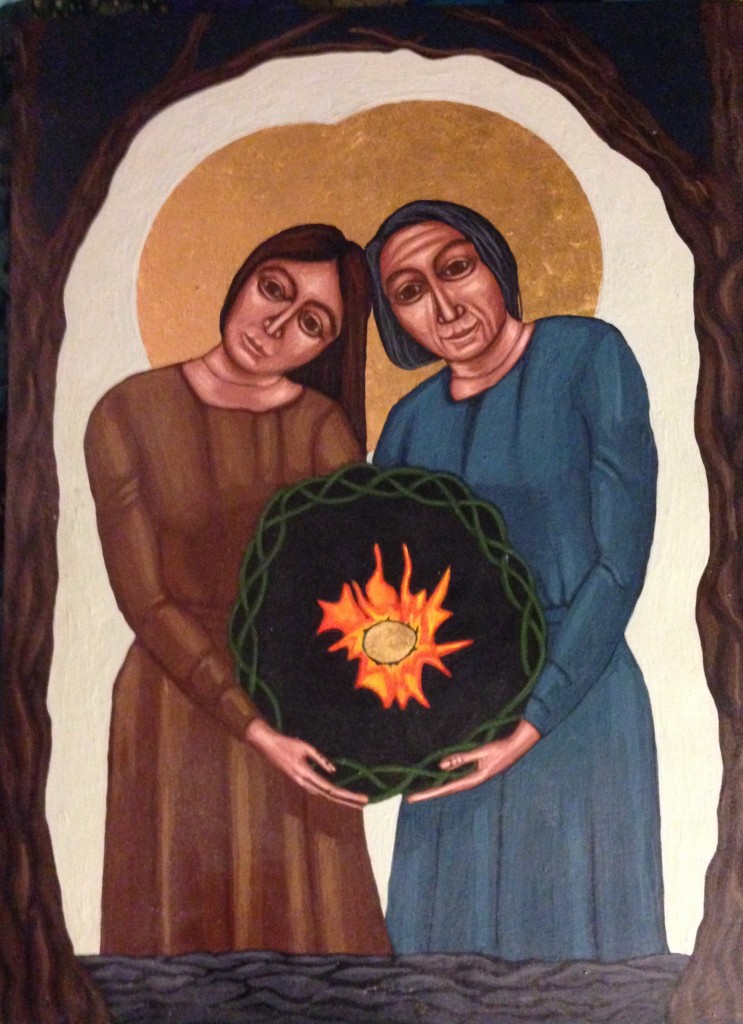The gospels for this terror-torn Advent have given us a bold and boisterous hero… John the Baptist… crying repentance in the wilderness… facing down evil in the halls of power. But this last gospel of Advent gives us a different kind of hero… a quiet hero… a gentle, serene hero… no less courageous, but with the added virtue of mother love.
Mary was not fearless from the first… far from it. But her faith was always stronger than her fear. And from the manger to the foot of the cross, her love was immediate and unconditional. That’s what it means to be a mother… to be our first channel of God’s grace… to be the calming, nurturing, protecting presence in our lives… exactly the peaceful presence we long for in times like these.
“An ounce of mother is worth a pound of clergy.” That’s a humbling Spanish proverb I came across while researching this gospel. If anything, I bet it vastly understates the case. On the brink of Christmas, this gospel gives us an opportunity to honor Mary for her coming role in the Nativity and by extension to honor all those women who not only give us life, but teach us how to live it. And that’s an essential distinction. As one wag put it: Giving birth doesn’t make you a mother, any more than owning a piano makes you a musician. It is very telling that the word “mother” is both a noun and a verb. As a verb “to mother” has much broader implications than just the act of giving birth.
So, what kind of a mother was Mary? How did she mother? And what can we learn from her, to draw closer to her Son? First of all, she was an improbable mother – a village girl who had the sun, the moon and the stars land on her one day. But for all her youth and inexperience, she looked at life through the lens of faith.
St. Ambrose captures the resilience of Mary’s faith when he preaches that: “She, who bore the Savior, understood the weight of an uncertain future. She, the humblest of women, found herself called to serve her Lord in a way that seemed impossible. Yet she embraced the call, both the gift of birth and the sacrifice of the cross.”
That’s what faith can do. It doesn’t banish fear. But it gives us the grace to accept our fears and to give them to God for his keeping. That’s the first lesson Mary teaches us: in the face of the overwhelming … Faith… in the shadow of tragedy … Faith… beyond physical and emotional endurance… Faith. Always. Faith.
The human nature of Jesus was nurtured every day by this woman of faith. And beyond faith was love, the defining characteristic of motherhood. Mary loved and protected her child… struggling to give him life in a stable… saving him in flight from Herod’s terror… and finally sharing his torment at the foot of his cross.
This week’s gospel gives us another dimension of Mary’s love. How telling that while still reeling from the angel’s message, she rushes to help her cousin Elizabeth… long-thought beyond her child-bearing years. That’s what saints do… the big ones we read about, the little ones we encounter everyday. They know that life is not all about them. They are here to serve. How apt that Christ’s first miracle was not a cure, but a simple act of compassion initiated by Mary to help an embarrassed newly married couple.
From Giotto to Bouguereau, the masters have struggled to capture Mary’s mother love. We need only look around to see that same mother love mirrored in our own family and in our extended parish family. One of the great privileges of my job is to stand with families in times of great emotional and physical trial. Repeatedly I am in awe of a mother’s faith and love, courage and endurance… the very virtues we desperately need in times of fear. This week’s gospel is a welcome opportunity to express our appreciation to Mary the Mother of Jesus and all those women who love us and look after us. Thanks, Mom.
The Reverend David Sellery, Episcopal Priest, Author, and Coach. Fr. Sellery presently serves as Priest-in-Charge, St. John’s Salisbury, CT. Fr. Sellery has excelled at using new media to increase outreach beyond the Church doors via his website, blog posts, and podcasts.
Image: Icon by Laurie Gudim

